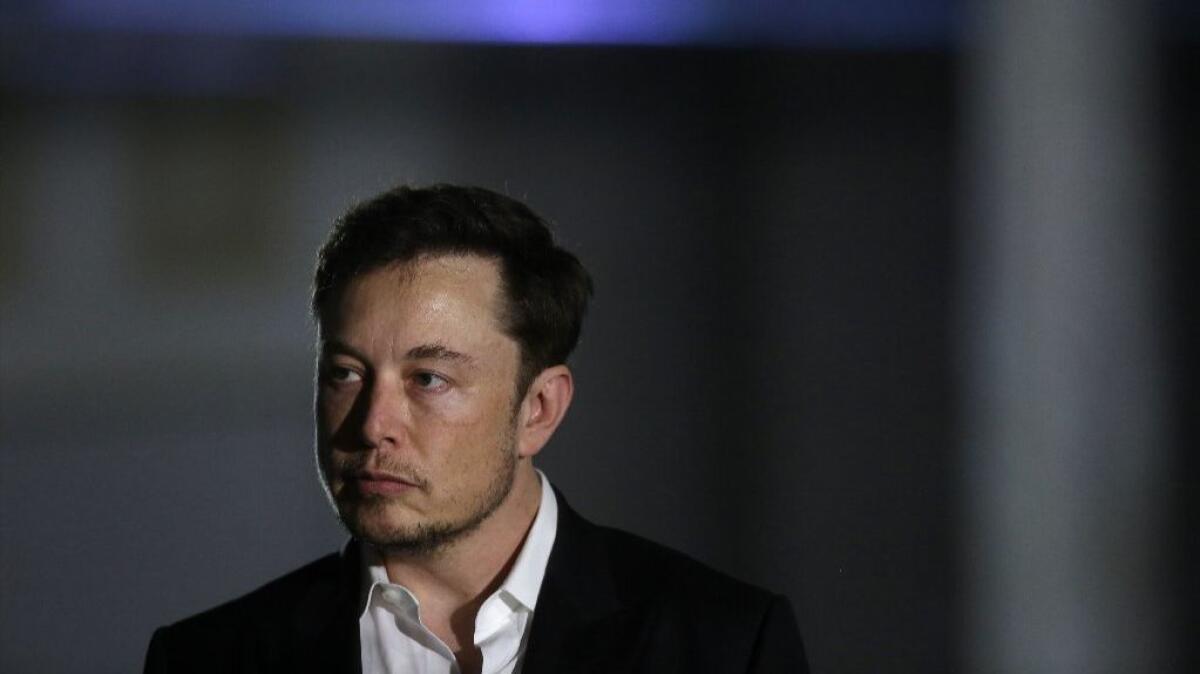‘Very unusual’: Elon Musk’s tweet on Tesla going private at specific price

- Share via
As he’s done with most everything else in his career, billionaire Elon Musk has turned the usual procedure of trying to take a company private on its ear.
Musk, the chief executive of Tesla Inc., casually tweeted Tuesday not only that he was “considering taking Tesla private” but also that he had secured the necessary funding to acquire the publicly held electric car maker and at a specific price: $420 a share.
That was a 23% premium above where Tesla’s stock has closed the previous day, which gave Tesla an implied overall value of $70 billion to $80 billion, leaving Wall Street baffled as to whether Musk was serious, because there was no formal offer as yet.
He was, as he showed in subsequent tweets and then in a blog post on Tesla’s website that prompted Nasdaq to halt trading in Tesla’s stock for 97 minutes in the afternoon. After reopening shortly before the closing bell, the stock jumped 11% on the day to $379.57 a share.
Some analysts and investment bankers couldn’t recall ever hearing of a specific going-private takeover offer floated by the target company’s CEO via social media, even if it was just Musk pondering the idea out loud.
“Elon Musk is known for his erratic behavior, so it’s very unusual but it’s not shocking,” said Jaemin Kim, a finance professor at San Diego State University.
Publicly held companies go private for several reasons, including the ability to escape the public glare of having a stock price that moves up and down daily and having to generate quarterly financial results that meet analysts’ and investors’ expectations.
Being private also enables the company to avoid the issue of short sellers, or investors who profit when a company’s stock declines, and it reduces media scrutiny because the firm’s financials are no longer public.
Musk said as much in his blog post, noting that the quarterly earnings cycle “puts enormous pressure on Tesla to make decisions that may be right for a given quarter but not necessarily right for the long term.”
Musk, who owns about 20% of Tesla’s stock, also noted that Tesla is “the most shorted stock” in history, which means “there are large numbers of people who have the incentive to attack the company.”
The interest in Tesla has been especially acute because the automaker has amassed major losses while ramping up production of its Model 3 sedan.
When top executives of a publicly held company want to take it private, they usually follow a procedure that keeps the public in the dark until the buyout offer is formally announced.
One recent example is Dell Technologies Inc. Its founder Michael Dell joined with a private equity firm to take the computer maker, then known as Dell Inc., private in 2013.
A special committee of Dell’s independent directors, working with financial and legal advisors, reached agreement on the offer, presented it to the full board (excluding Michael Dell) for approval and, once approved, publicly announced the $24.4-billion offer.
Amid complaints from some investors such as Carl Icahn, the bid for Dell was raised slightly, later approved by Dell’s shareholders and eventually completed in October 2013. Dell recently again became a publicly traded firm.
Lloyd Greif, head of the Los Angeles investment bank Greif & Co., said Musk’s decision to disclose his Tesla proposal on Twitter was “quizzical, to put it mildly.”
Bidders usually “put their money where their mouth is, and they put an offer out there and present it to the board,” Greif said. “They certainly don’t tweet it.”
In addition, Greif said, “unless [Musk] follows through on what he said in his tweet, if I’m the SEC I look at this” because “it’s clearly moving the stock [price].”
Kim of San Diego State said Musk’s tweets “could be regarded as rash, but I’m not sure they violate any existing law.”
The Securities and Exchange Commission declined to comment. In 2013, the SEC said public companies could use social media such as Twitter “to announce key information,” provided that investors are aware that those outlets will be used “to disseminate such information.” Musk tweets steadily and at all hours.
Musk also said that he hoped current Tesla shareholders would stay with the company if it goes private but that the buyout offer would enable them to cash out.
If they decide to stay with a private Tesla, investors would lose the up-to-the-minute reading on what their shares are worth along with the ability to sell quickly, and it’s unclear what voting rights they would have, Greif said.
Musk said external shareholders and employee shareholders in a private Tesla would “have an opportunity to sell or buy approximately every six months.”
Twitter: @PeltzLATimes
More to Read
Inside the business of entertainment
The Wide Shot brings you news, analysis and insights on everything from streaming wars to production — and what it all means for the future.
You may occasionally receive promotional content from the Los Angeles Times.











